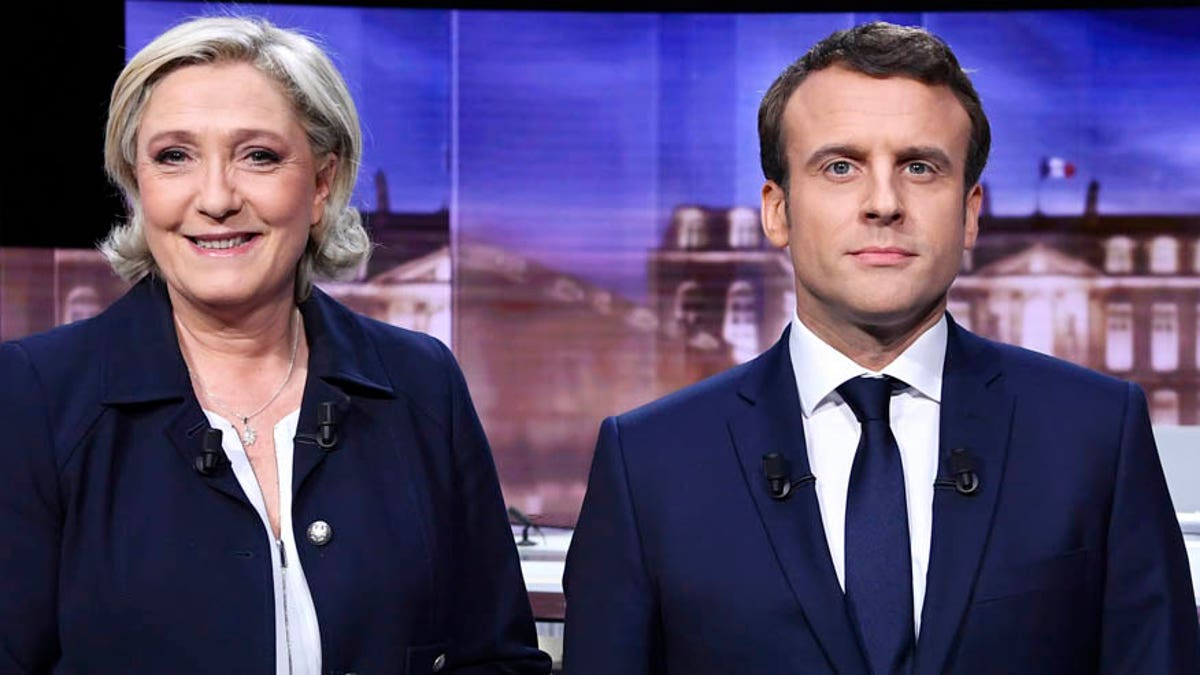
French presidential election candidate for the far-right Front National party, Marine Le Pen, left, and French presidential election candidate for the En Marche! movement, Emmanuel Macron, will face off in the presidential election on Sunday. (French presidential election candidate for the far-right Front National party, Marine Le Pen, left, and French presidential election candidate for the En Marche! movement, Emmanuel Macron, will face off in the presidential election on Sunday.)
First of all, a sigh of relief is in order. The election of Marine Le Pen in France’s presidential election on Sunday would have been bad news for France, for the United States, and for the world. Le Pen is no friend of conservatism – instead, as my AEI colleague Marc Thiessen put it, she is “the left's caricature of Trump come to life.”
At home, her agenda of economic protectionism and government-led reindustrialization would lead the French economy closer to a precipice of a disaster. She advocated the withdrawal of France from the common European currency. Sure, the introduction of the Euro might have been an instance of overreach by European leaders at the time. However, Frexit, which would have been likely accompanied by a default on France’s sovereign debt, could trigger a global financial panic of a magnitude far exceeding the experience of 2008 and 2009.
Le Pen’s ties to Moscow are well known, including €11m worth of loans from Russia. The hacking of the emails of the campaign of her opponent, Emmanuel Macron, revealed just before the end of the campaign, does not appear accidental. Le Pen repeatedly denied that there had been a Russian invasion of Ukraine and asserted that Crimea, annexed illegally by Vladimir Putin in 2014, “had always been Russian.”
Like the United States in 2016, France is living through a moment of public discontent with politics. The grievances behind the anger directed at the political class are real. Yet, those who are trying to draw parallels with the US election need to be careful. For one, Emmanuel Macron is no Hillary Clinton.
Sure, the 39-year old former banker and a graduate of one of the country’s most elite educational institutions, the Ecole nationale d’administration, might be seen vaguely as a member of the country‘s establishment. Yet, he does not exude entitlement nor does he have a corrupt, self-serving political dynasty behind him. Notwithstanding the WikiLeaks' dump of 9 gigabytes of stolen data from servers of his campaign on Friday, the most controversial thing about France’s president-elect seems to be the fact that he is married to his high school teacher, 24 years his elder.
None of this is meant to suggest that Macron’s decisive victory on Sunday is in itself a cause for celebrations. Just like in the case of former president Barack Obama, Macron’s biggest strength – the fact that people on the left and right are able to project their own ideas of hope and renewal on him – might easily become his biggest weakness.
In particular, unless the government he appoints moves aggressively to liberalize France’s labor markets, liberalize areas of the economy shielded from competition, and drive down the cost of doing business, the country will not see a return of economic dynamism. To be sure, France is far from being an economic basket case – its per capita income is comparable to that of the United Kingdom. However, with a growth rate of a mere 1.4 percent, the French economy is failing to generate economic opportunities. Since the onset of the crisis of 2008, youth unemployment has exceeded 20 percent and hundreds of thousands of particularly young French have left the country in search of jobs.
Red tape remains an acute problem too. According to the World Bank’s Doing Business project, France ranks 100th in the world in the ease of registering property, behind Uzbekistan and Burundi. If an entrepreneur in France buys a piece of real estate, he will spend three times as much time dealing with bureaucrats than in an average developed economy.
Among other promises, Macron has vowed to change all that and turn France into a much more flexible and dynamic place, friendly to entrepreneurs and start-ups. But the necessary reforms are going to upset influential interest groups, particularly trade unions. Unless he can seize the window of opportunity of the first months of his presidency to radically transform the French economy, his presidency risks being a simple continuation of the status quo. That would make a 2022 victory by a candidate of either the far left or the far-right inevitable.




















